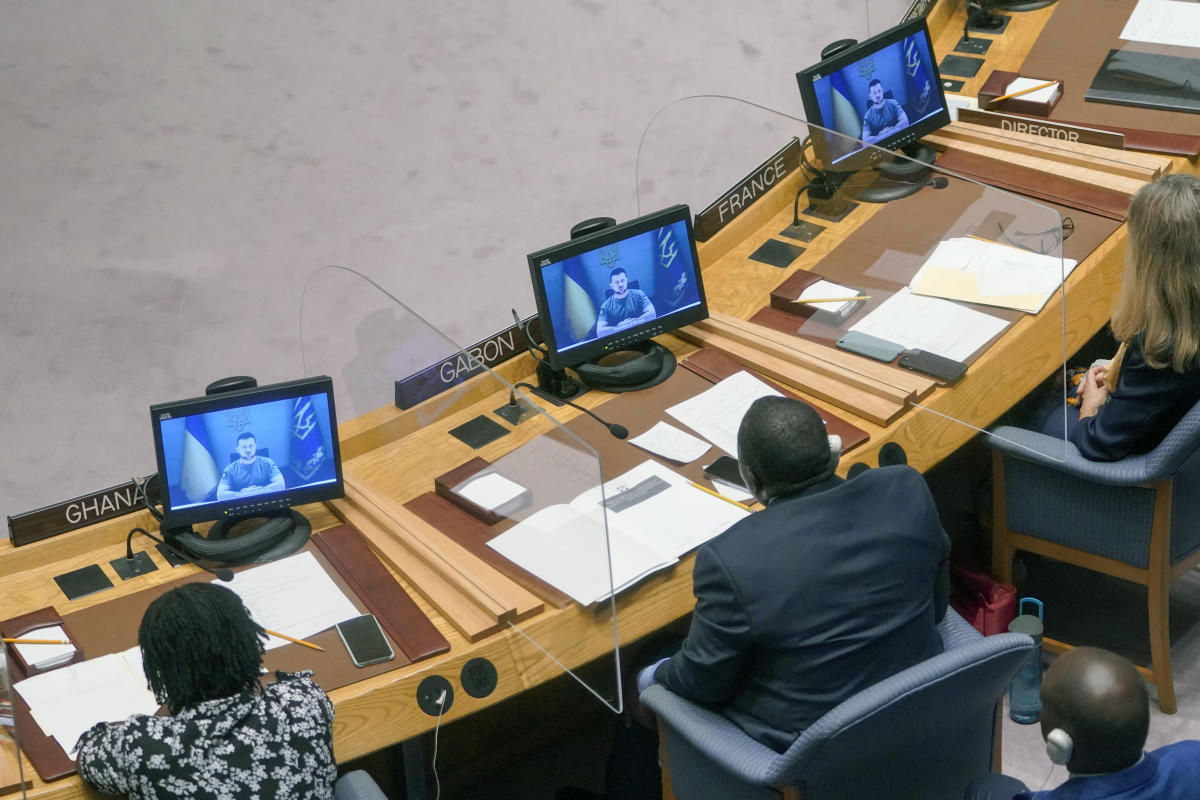
UNITED NATIONS (AP) — Ukrainian President Volodymyr Zelenskyy said Wednesday that “the world’s future” is being decided in its war against Russia’s “insane aggression” and that maintaining his country’s independence is “the security of the entire world.”
He warned the U.N. Security Council on the six-month anniversary of the invasion that if Russia isn’t stopped, “then all these Russian murderers will inevitably end up in other countries — Europe, Asia, Africa, Latin America.”
“There are traces of Russian war criminals everywhere and we must all get united and act decisively as soon as possible so there are no more traces of Russian missiles, and no more cities burned by Russian military — so that there would be no threat of the radiation catastrophe ever, ever again,” he said.
Zelenskyy addressed the U.N.’s most powerful body not only on the anniversary of the invasion but on Ukraine’s independence day, stressing the crucial link between what happens in the war to the future security and geopolitical architecture of the world.
As his country celebrates its 1991 independence from the former Soviet Union, “everyone can see how much the world is dependent on our independence,” Zelenskyy said.
He stressed the sovereignty and territorial of all countries and demanded that Russia withdraw from all Ukrainian territory it has captured and end its territorial ambitions.
Zelenskyy claimed Russia “rewards murderers and encourages executioners” and told council members that his government will introduce a U.N. General Assembly resolution to hold Russia accountable for the crime of aggression against Ukraine.
U.N. Secretary-General Antonio Guterres has called for a “Summit of the Future” next year and Zelenskyy said it would be symbolic to hold it in Ukraine, because “it is on the territory of Ukraine that the world’s future is decided, whether we will have a future at all.”
Zelenskyy spoke by video over objections from Russia’s U.N. ambassador, Vassily Nebenzia, who said council rules require leaders to be present in the council chamber at U.N. headquarters in New York to deliver a speech. He said the Ukrainian leader already had been allowed to give video addresses on two previous occasions because of special circumstances and should not be allowed a third time.
The overwhelming majority of the 15-member council disagreed — 13 countries voted in favor of another video speech by Zelenskyy, Russia voted against it and China abstained.
Guterres called the six-month anniversary of the Russian invasion “a sad and tragic milestone,” with no end in sight to the war.
He pointed to thousands of civilian casualties, grave violations of international human rights and humanitarian law, millions of Ukrainians who have lost their homes and are displaced or refugees, and rapidly rising humanitarian needs as winter approaches.
“The consequences of this senseless war are being felt far beyond Ukraine,” Guterres said. “We are seeing new vulnerabilities emerge in a global environment already worn out by conflicts, inequality, pandemic-induced economic and health crises, and climate change — with a disproportionate impact on developing countries.”
Guterres warned that the acceleration of already high food, fertilizer and energy prices “has triggered a global crisis that could drive millions more into extreme poverty.”
U.S. Ambassador Linda Thomas-Greenfield addressed Zelenskyy, saying the United States stands with Ukraine “today and every day, and every Russian bomb that falls only strengthens our resolve to support your sovereignty and your independence.”
Six months after the invasion, she said, “Russia’s goal is as clear as ever: to dismantle Ukraine as a geopolitical entity and erase it from the world map.”
Nebenzia again blamed “the Kyiv regime” that came to power in 2014 — the year Russia invaded and annexed Crimea — for what many council members called “the catastrophic consequences” of six months of hostilities.
To Western nations claiming Russia is threatening Ukrainian independence, Nebenzia said, “the only threat to the independence of Ukraine is the current government of Kyiv,” which he claimed makes no major decision without consulting Western advisers.
He also accused Ukraine’s government of suppressing the opposition, persecuting people for reading Russian language news, and imprisoning them for accepting humanitarian aid from Russia.
After the meeting, Ukrainian Ambassador Sergiy Kyslytsya read a statement on behalf of 55 countries and the European Union denouncing Russia for its “unprovoked full-scale and illegal invasion” and deploring its failure to comply with U.N. General Assembly resolutions calling for an immediate halt to its use of force against Ukraine.
With diplomats from many of the countries standing alongside, the statement read by Kyslytsa reaffirmed their solidarity with Ukraine, condemned Russian missile strikes that have killed civilians and destroyed civilian buildings, and reiterated their demand for an immediate cease-fire and withdrawal of Russian forces.
Nebenzia was asked by a reporter if the media would be back for a one-year anniversary.
“I’m no fortuneteller,” he replied.




